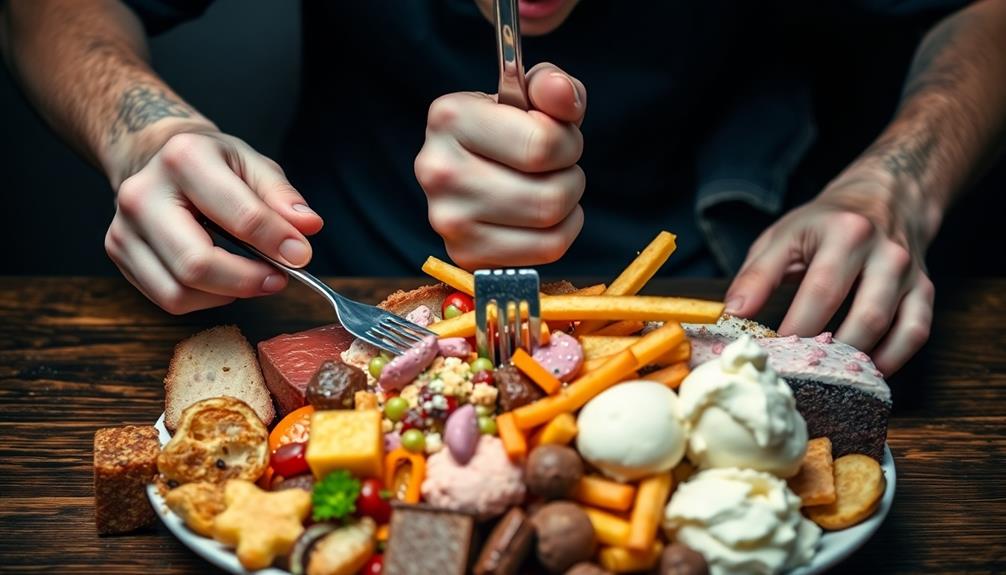Food addiction and compulsive eating can consume your life, similar to substance addiction. You might struggle with intense cravings and feel a loss of control, often driven by emotional distress. As you eat highly palatable foods, your brain's reward circuitry activates, reinforcing these behaviors. Guilt and shame can accompany binge episodes, complicating your mental well-being. Biological and genetic factors may heighten your susceptibility, making it harder to break free. But with the right professional support and strategies, recovery is possible. Discovering effective methods can greatly transform your relationship with food and yourself, so there's much more to explore.
Key Takeaways
- Food addiction is characterized by compulsive eating behaviors and intense cravings for highly palatable foods, similar to substance addiction.
- Emotional distress often triggers compulsive eating, leading to feelings of guilt, anxiety, and shame that complicate recovery.
- Biological and genetic factors influence vulnerability to food addiction, including brain pleasure centers and genetic predispositions affecting calorie management.
- Treatment involves professional guidance, dietary management, support groups, and specialized programs to address psychological and nutritional challenges.
- Understanding the health implications, such as obesity and related diseases, is crucial for making informed dietary choices and promoting recovery.
Understanding Food Addiction
What drives some people to repeatedly consume certain foods despite negative consequences? Understanding food addiction reveals a complex interplay between biology and behavior. It's characterized by compulsive eating behaviors, particularly involving highly palatable foods that activate your brain's reward circuitry. This response is similar to how substance addiction works, making it hard to resist those intense cravings.
For example, many individuals find themselves drawn to Mushroom Masala, a dish known for its rich blend of spices that enhances its earthy flavor, making it a comfort food for many. The Yale Food Addiction Scale (YFAS) helps identify these addictive-like eating behaviors. If you find yourself consistently losing control over your food intake, you might be experiencing symptoms that overlap with binge eating disorder. This disorder involves episodes of uncontrollable eating, often triggered by emotional distress rather than hunger.
Neuroscience research shows that when you indulge in these rewarding foods, your brain releases dopamine, reinforcing the cycle of compulsive eating. This can lead to a vicious loop where you seek comfort in food, only to feel guilt or shame afterward.
As you navigate your relationship with food, recognizing these patterns can be the first step toward understanding and addressing food addiction, ultimately aiding in your journey toward healthier eating habits.
Signs of Food Addiction
Many signs can indicate food addiction, and recognizing them is essential for taking control of your eating habits. If you find yourself eating despite not being hungry, that's a red flag. You might experience intense cravings for specific highly processed foods when they're unavailable, which can lead to binge eating episodes. These eating behaviors often stem from a loss of control; you may even eat in secret or to the point of physical discomfort.
Additionally, emotional indicators like guilt, anxiety, and depression surrounding your eating habits can disrupt your daily life. If you feel irritable or agitated when trying to cut back on certain foods, you might also be facing withdrawal symptoms. Understanding these signs can help you identify food addiction in yourself or others.
Here's a quick reference table for common signs of food addiction:
| Sign | Description |
|---|---|
| Loss of Control | Eating more than intended or against your will |
| Cravings | Intense desire for specific foods |
| Emotional Indicators | Guilt, anxiety, or depression related to eating |
| Secretive Eating Behaviors | Hiding food or eating alone |
| Withdrawal Symptoms | Irritability or agitation when reducing certain foods |
Psychological Effects of Food Addiction
Food addiction can stir up intense feelings of emotional distress and guilt that weigh heavily on your mind.
The desire for comfort can lead to a craving for rich flavors, similar to those found in dishes like Red-Braised Pork Belly, which can provide temporary solace but may exacerbate feelings of guilt afterward.
You might find yourself engaging in compulsive eating behaviors, seeking comfort in food while battling the negative emotions that follow.
As you navigate this cycle, it's essential to recognize how these patterns impact your daily life and mental well-being.
Emotional Distress and Guilt
While indulging in your favorite snacks might provide temporary pleasure, the emotional distress that often accompanies food addiction can be overwhelming. Many people find themselves trapped in a cycle of compulsive eating, where negative emotions drive them to consume large quantities of food, even when they're not physically hungry.
This behavior often leads to intense feelings of guilt and shame afterward, compounding the emotional turmoil. The rich flavors and cultural significance of comfort foods, such as traditional Brazilian dishes, can further complicate this relationship with food.
If you struggle with binge eating disorder (BED), you may experience significant psychological effects, including symptoms of depression and anxiety. The fleeting satisfaction from food diminishes over time, requiring increased intake to achieve the same level of pleasure.
As you navigate this cycle, you might face withdrawal symptoms, such as irritability and agitation, when trying to cut back on certain foods. These symptoms can further complicate emotional regulation, making it even harder to escape the grip of food addiction.
Ultimately, the emotional distress tied to your eating behaviors can severely impair your daily functioning, leaving you feeling trapped. Recognizing these patterns is the first step toward understanding and addressing the psychological effects of food addiction.
Compulsive Eating Behaviors
Compulsive eating behaviors can take a significant toll on your mental health, often exacerbating feelings of guilt and shame after overeating. These patterns frequently stem from emotional triggers like stress or trauma, highlighting the complex psychological relationship between food and emotional regulation.
For instance, certain cultural dishes, such as Muamba De Galinha, can evoke strong emotional memories, making it challenging to resist cravings associated with comfort foods. As you navigate food addiction, you might find yourself caught in a cycle of binge eating disorder, where cravings intensify and lead to excessive overeating.
Over time, you may develop a tolerance, requiring larger quantities of food to achieve the same level of satisfaction, similar to substance addiction. This not only affects your physical health but can also impair daily functioning, disrupting personal relationships and work responsibilities.
When you try to reduce or eliminate certain trigger foods, withdrawal symptoms like irritability and intense cravings can surface, often peaking around 3-5 days after cessation.
Recognizing these compulsive eating behaviors is essential for breaking the cycle. By addressing the emotional triggers that fuel your food addiction, you can start to reclaim control over your eating habits and improve your overall quality of life. Understanding these dynamics is the first step toward healing and recovery.
Biological and Genetic Factors
When you eat highly palatable foods, your brain's pleasure centers light up, releasing dopamine and creating a reward response similar to that of addictive drugs.
This phenomenon can be seen in various culinary experiences, such as the rich flavors found in Asian cuisine, which often evoke strong emotional responses.
Your genetic makeup may also play a role in this, as certain gene markers can make it harder for you to manage calorie intake.
Understanding these biological and genetic factors sheds light on why some people are more vulnerable to food addiction than others.
Brain Pleasure Response
The brain's pleasure response plays a crucial role in food addiction, as it activates powerful reward pathways that drive cravings and overeating. When you consume highly processed foods rich in sugar, fat, and salt, your brain releases dopamine, the neurotransmitter linked to pleasure. This response can be similar to that triggered by addictive substances, making it easy to see why you might find yourself reaching for more.
Traditional Italian dishes, such as agnolotti, offer rich flavors with wholesome ingredients that may not stimulate the brain's reward system in the same manner as processed foods do.
Highly palatable foods stimulate your brain's reward circuitry more intensely than whole foods, reinforcing compulsive eating behaviors. As you indulge, your brain adapts, and you may develop a tolerance, requiring larger quantities of food to achieve the same level of satisfaction. This cycle of craving and reward creates a loop that can be hard to break.
Neuroimaging studies reveal structural abnormalities in the brains of individuals struggling with food addiction, suggesting a biological basis for these compulsive eating patterns. Understanding this brain pleasure response can help you recognize the powerful forces at play in your eating habits and empower you to make more mindful choices in your journey toward healthier eating.
Genetic Vulnerability Factors
Genetic factors play a significant role in your vulnerability to food addiction, influencing how your brain responds to highly palatable foods. Studies indicate that certain gene markers related to addiction are shared between food addicts and substance abusers. If you have a genetic predisposition, your brain structure may exhibit abnormalities in areas linked to reward and impulse control, heightening the risk for compulsive eating behaviors.
| Genetic Factors | Impact on Food Addiction |
|---|---|
| Genetic Predisposition | Increases risk of food addiction |
| Brain Structure | Abnormalities in reward centers |
| Serotonin Pathways | Influences cravings for foods |
| Dopamine Pathways | Affects response to palatable foods |
| Compulsive Behaviors | Heightened response to triggers |
Variations in serotonin and dopamine pathways can lead to increased cravings for highly palatable foods. This activation of brain pleasure centers mimics the effects of addictive drugs, underscoring the biological mechanisms driving food addiction in those who are genetically vulnerable. Recognizing these factors can help you understand your relationship with food and inform strategies for managing compulsive eating behaviors.
Food Addiction vs. Binge Eating Disorder
Understanding the distinctions between food addiction and binge eating disorder (BED) is vital for effective treatment and support. Food addiction is marked by a loss of control over eating behaviors, leading to compulsive consumption of highly palatable foods, similar to how traditional Mexican dishes like Chilaquiles can be both comforting and indulgent.
In contrast, BED involves episodes where you eat large quantities of food in a short timeframe, often feeling distress or guilt afterward.
Research shows that 80-90% of individuals with bulimia nervosa exhibit signs of food addiction, and around 50% of those with BED meet the criteria for it. While food addiction can exist independently of obesity, BED often follows a cycle of restrictive dieting followed by binge eating. This highlights the complex relationship between the two conditions.
The Yale Food Addiction Scale (YFAS) is a useful tool for evaluating addictive-like eating behaviors, revealing that about 14% of adults may fit the criteria for food addiction, comparable to alcohol addiction rates.
Both food addiction and BED frequently present significant comorbidity, with 27%-30% of individuals with food addiction also experiencing symptoms of BED. Understanding these nuances is essential for tailoring targeted treatment approaches that address both mental health and eating behaviors.
Health Implications of Food Addiction
While many people may not realize it, food addiction poses serious health risks that extend beyond weight issues. If you're struggling with food addiction, you might find yourself engaging in addictive behaviors that lead to considerable health concerns. Over two-thirds of U.S. adults are classified as overweight or obese, and food addiction contributes to this crisis.
However, it's vital to know that food addiction can exist independently of obesity; you can struggle with it without being classified as obese. For instance, after a holiday feast, the temptation to indulge in leftover dishes, like Turkey Sandwiches, can exacerbate these addictive tendencies.
The implications of food addiction include serious health risks such as type 2 diabetes, heart disease, and certain types of cancer. These conditions are often associated with obesity but can affect those who may not fit that category.
The prevalence of food addiction is around 14% among adults, comparable to alcohol addiction. As you navigate your food environment, understanding the relationship between food addiction and binge eating disorder (BED) is vital. Not everyone who's obese meets the criteria for food addiction, but the risk of weight gain and related health problems increases markedly for those who do.
Recognizing these health implications is the first step towards making informed choices.
Treatment and Recovery Options
When tackling food addiction, getting professional guidance is essential for maneuvering both the psychological and nutritional challenges you face.
Incorporating fresh, seasonal ingredients, like those found in Nettle and Potato Soup, can enhance your meals and promote healthier eating habits.
Support groups can provide a sense of community and accountability, making your recovery journey less isolating.
Additionally, implementing dietary management strategies can help you avoid triggers and foster healthier eating habits.
Professional Guidance Importance
Professional guidance is essential for anyone grappling with food addiction, as it offers personalized strategies that can greatly enhance recovery. By working with nutritionists and psychologists, you can develop tailored strategies that address the unique challenges of your condition.
Additionally, exploring healthier food options, like Candy Corn Fruit Parfaits, can provide delicious yet nutritious alternatives that support your recovery. These professionals help you navigate the psychological aspects of food addiction, ensuring you gain a deeper understanding of your behaviors and triggers.
Specialized treatment centers can further support your recovery journey by providing extensive care that tackles the medical, nutritional, and psychological aspects of addiction. Here, you can find structured programs that promote healthier eating patterns and offer accountability.
In addition to individual support, engaging with support groups like Food Addicts in Recovery Anonymous (FAIA) can foster a sense of community. These groups utilize a 12-step approach, helping you build connections with others who share similar struggles.
Together, you can explore strategies for managing cravings and reinforcing your commitment to recovery. With the right professional guidance, you'll be better equipped to overcome food addiction and work toward a healthier, more balanced life.
Support Group Benefits
Support groups play an essential role in the treatment and recovery journey for those dealing with food addiction. Organizations like Food Addicts in Recovery Anonymous offer a community-based approach, fostering accountability and shared experiences among members facing similar challenges.
Here are some key benefits you can expect:
- Improved emotional well-being, reducing feelings of isolation
- Development of effective coping mechanisms for emotional distress
- Enhanced motivation and commitment to recovery
- Access to resources for recognizing eating patterns and triggers
Engaging in support groups not only connects you with others who understand your struggles, but it also helps you grow personally. Many groups utilize a 12-step program, which has proven effective in helping individuals develop healthier habits.
Research shows that those who participate in support groups report higher motivation levels compared to those trying to tackle food addiction alone. By joining a support group, you gain valuable insights into your eating patterns and triggers, ultimately leading to a more informed and empowered recovery journey.
The sense of community and shared determination can be incredibly uplifting as you work towards a healthier relationship with food.
Dietary Management Strategies
Effective dietary management strategies are essential for anyone maneuvering the complexities of food addiction. By identifying emotional triggers that lead to compulsive eating, you can develop healthier emotional regulation techniques. This awareness allows you to cope with cravings and stress without resorting to binge eating behaviors.
Consider engaging in cognitive behavioral therapy (CBT) alongside nutrition counseling. These approaches help you create healthier eating patterns while developing effective coping mechanisms. Specialized food addiction treatment centers can offer thorough care, addressing medical, nutritional, and psychological aspects of recovery.
Joining support groups like Food Addicts Anonymous or Overeaters Anonymous can also be invaluable. These 12-step programs foster community support and accountability, emphasizing physical, emotional, and spiritual healing during your recovery journey.
In some cases, medications like naltrexone and bupropion may help reduce binge eating behaviors, especially when paired with behavioral interventions.
Support and Resources Available
How can individuals struggling with food addiction find the right help? There are numerous resources available to guide you on your journey toward recovery. You can seek out specialized food addiction treatment centers that provide extensive care, addressing medical, nutritional, and psychological issues.
Support groups like Food Addicts in Recovery Anonymous and Overeaters Anonymous foster a sense of community and accountability through their 12-step programs.
Consider the following resources:
- Support Groups: Join groups offering camaraderie and shared experiences.
- Self-Assessment Tools: Utilize online quizzes to evaluate your eating behaviors.
- Professional Guidance: Consult with nutritionists or psychologists for tailored support.
- Educational Resources: Explore information from organizations like the National Institute of Mental Health.
These options can help you better understand your relationship with food and identify any underlying eating disorders or psychological issues.
Comorbidity With Other Disorders
Food addiction often goes hand in hand with other psychological disorders, complicating the recovery journey. Research shows that about 27% to 30% of individuals with food addiction also meet the criteria for binge eating disorder (BED). This high comorbidity highlights the psychological overlap between these conditions.
Many people struggling with food addiction experience significant distress and impairment in daily functioning, suggesting a strong link to mood disorders. You might notice that depressive symptoms and negative emotional states are common among those facing food addiction, pointing to how emotional health can drive unhealthy eating behaviors.
Impulsivity is another characteristic often seen in individuals with food addiction. This trait resembles those found in substance use disorders and other compulsive behaviors, making it vital to address impulsivity in treatment.
Lastly, community studies reveal a diverse range of weight statuses among individuals with food addiction, emphasizing the complexity of its relationship with obesity and various eating disorders. Understanding these connections is important for effective intervention and support, as they can greatly influence your path to recovery.
Future Research Directions
Understanding the complexities of food addiction and its comorbidities sets the stage for future research directions that aim to clarify this condition. Researchers are working to establish clearer diagnostic criteria to differentiate food addiction from other eating disorders.
Neuroimaging studies will be essential in exploring brain connectivity and activity patterns, especially within reward circuitry, to understand how these mechanisms affect eating behaviors.
Future research could focus on:
- Investigating the impact of chronic stress on the hypothalamic-pituitary-adrenal axis and its relationship to food addiction.
- Examining the role of peripheral satiety networks in appetite regulation and their potential dysfunction in those struggling with food addiction.
- Evaluating how different treatment strategies can be tailored to meet the unique needs of individuals with food addiction.
- Promoting an interdisciplinary approach that combines psychology, nutrition, and neuroscience to develop thorough interventions.
This multifaceted exploration won't only enhance your understanding of food addiction but also pave the way for more effective treatment options, ultimately improving the lives of many who face this challenging condition.
Frequently Asked Questions
What Is the Mental Illness for Food Addiction?
Food addiction isn't classified as a formal mental illness, so you won't find specific diagnostic criteria. However, many people struggle with behaviors resembling addiction, leading to emotional and psychological challenges that can complicate their lives.
What Is Compulsive Eating Behavior and Food Addiction?
Compulsive eating behavior involves losing control over your eating, often consuming large amounts despite negative effects. Food addiction, on the other hand, is about craving highly palatable foods that activate pleasure centers in your brain.
What Are the Psychological Causes of Food Addiction?
When life feels like a storm, you might turn to food for comfort. Psychological causes of food addiction often stem from trauma, low self-esteem, and grief, leading you to seek solace in every bite.
What Causes Compulsive Eating Disorder?
Compulsive eating disorder often stems from a mix of biological, psychological, and environmental factors. Hormonal imbalances, emotional distress, and societal pressures can lead you to use food as a coping mechanism for various challenges.
Conclusion
In steering through the nuances of food addiction, you're not alone in this struggle. It's a challenging cycle that can feel overwhelming, but with the right support and strategies, you can break free from the binds of compulsive eating. Remember, every small step towards understanding and healing is a significant advancement. So, embrace empowerment, seek support, and aim for serenity in your relationship with food. Your journey to a healthier, happier you is worth every effort.










